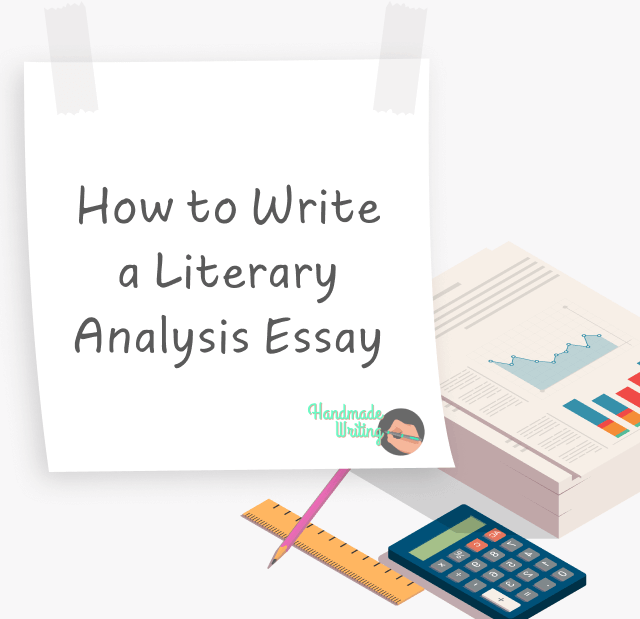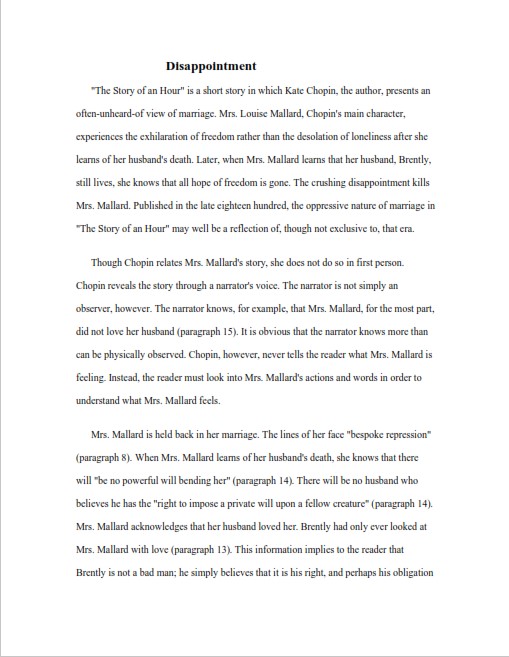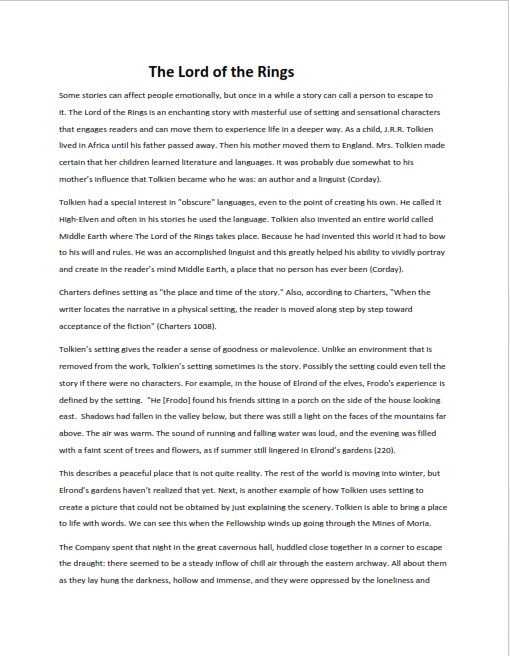
A profile essay, or article, is a piece of journalistic-cum-literary writing. The aim is to present factual information on a given topic (person, place, animal, or event) while writing with an individual tone and style. In this article, we will expand on the concept of a profile essay. We will also tackle what a profile is and what purpose profiles serve. Finally, we will present strategies for preparing your research and strengthening your writing technique, as well as offer tips on structure and potential topics.
Check this short list of literary analysis essay example to get the idea:
After you’ve answered these questions, you’ll have to determine the relationships between the ideas and storyline, the characters’ behavior, and how their roles change in a piece. Conduct comprehensive research to get information about the text, its background, and the author. These materials will help you understand the writer’s intentions and ideas better.
When studying at school, college, or university, you get dozens of writing tasks, and a literary analysis essay is one of them. You have to study a piece of literature and write about the core idea, characters, or the author’s intentions. In some cases, it’s necessary to explore style, plot, structure, and other elements to explain how they complement or weaken each other.
How to Write a Stellar Profile Essay?

Sometimes professors allow students to pick topics themselves, and it’s a lucky ticket in the academic world. You can choose your favorite book or novel, research it, and provide excellent analysis. If you’ve written about the piece you love before or want to impress the professor, we recommend you to check our list of literary analysis essay topics for more ideas:
Writers use literary devices to create special effects that help readers understand their intentions, interpret their works, and analyze them. Besides, these elements often become the author’s identifying feature that helps them stand out from the crowd. Here’s the list of literary devices you have to know:
An excellently composed literary analysis essay demonstrates that you’ve looked at the events described in the literature piece from different perspectives. Examination of all the major elements, including a text structure, plot, author’s style, characters’ qualities, main theme, and form is an essential stage of the writing process. After you study all the important components, provide a conclusion on how they interact with each other and influence your overall impression.
The writer’s style tells a lot about their piece – even more than you can imagine. Besides, the characters’ language style is one of their most important features. It helps readers understand their personalities. If your topic is connected with the character analysis, taking notes about language is a must for you.

Consider what style of language the author uses. Are the sentences short and simple or more complex and poetic?
The first step is to carefully read the text(s) and take initial notes. As you read, pay attention to the things that are most intriguing, surprising, or even confusing in the writing—these are things you can dig into in your analysis.
A key part of literary analysis is backing up your arguments with relevant evidence from the text. This involves introducing quotes from the text and explaining their significance to your point.
…The story’s focus, therefore, is not upon the divine revelation that may be waiting beyond the door, but upon the mundane process of aging undergone by the man as he waits.
Step 1: Reading the text and identifying literary devices
Some students prefer to write the introduction later in the process, and it’s not a bad idea. After all, you’ll have a clearer idea of the overall shape of your arguments once you’ve begun writing them!
Say you’re analyzing the novel Frankenstein. You could start by asking yourself:
Your thesis statement should be an answer to this question—not a simple yes or no, but a statement of why this is or isn’t the case:
- Demonstrate your familiarity with the topic and scholarly context
- Develop a theoretical framework and methodology for your research
- Position yourself in relation to other researchers and theorists
- Show how your research addresses a gap or contributes to a debate
A good literature review doesn’t just summarize sources – it analyzes, synthesizes, and critically evaluates to give a clear picture of the state of knowledge on the subject.
A literature review is a survey of scholarly sources (such as books, journal articles, and theses) related to a specific topic or research question.
This article has been adapted into lecture slides that you can use to teach your students about writing a literature review.
Why write a literature review?
Depending on the length of your literature review, you might want to divide the body into subsections. You can use a subheading for each theme, time period, or methodological approach.
A literature review is often the foundation for a theoretical framework. You can use it to discuss various theories, models, and definitions of key concepts.
For example, if you are reviewing literature about inequalities in migrant health outcomes, key themes might include healthcare policy, language barriers, cultural attitudes, legal status, and economic access.

To keep your points focused, it’s important to use a topic sentence at the beginning of each paragraph.
In a play, you might consider how relationships between characters are built up through different scenes, and how the setting relates to the action. Watch out for dramatic irony, where the audience knows some detail that the characters don’t, creating a double meaning in their words, thoughts, or actions.
If you do write the introduction first, you should still return to it later to make sure it lines up with what you ended up writing, and edit as necessary.
Your thesis in a literary analysis essay is the point you want to make about the text. It’s the core argument that gives your essay direction and prevents it from just being a collection of random observations about a text.
Paragraph structure
Franz Kafka’s “Before the Law” is not a religious parable, but a story about bureaucratic alienation.
However, this statement is too simple to be an interesting thesis. After reading the text and analyzing its narrative voice and structure, you can develop the answer into a more nuanced and arguable thesis statement:
The tone of the text is also worth considering. Is the story intended to be comic, tragic, or something else? Are usually serious topics treated as funny, or vice versa? Is the story realistic or fantastical (or somewhere in between)?
What word choices stand out as interesting or unusual? Are words used figuratively to mean something other than their literal definition? Figurative language includes things like metaphor (e.g. “her eyes were oceans”) and simile (e.g. “her eyes were like oceans”).

In a literary analysis essay, there are usually three body paragraphs. Each paragraph is written to explain one of the critical elements. Make sure that you start writing the body paragraph with a topic sentence.
- Analyze the historical context of the book ‘forty rules of love.’
- Analyze how does an author’s background influence his or her writing niche?
- Review the most potent literary devices used by the author.
- Analyze the significance of a book and its influence on other writers.
- Discuss the settings and background and how they support the storyline.
- Evaluate the mood of the story and its effect on your emotional state.
- Analyze the antagonist’s motivation and raison d’être.
- Assess the efficiency of foreshadowing in the book.
- Advantages and disadvantages of playing video games for children
- Is addiction a personal choice or disease?
- How single parenting affects the physical and psychological well being of a child?
- How upbringing and personality are related?
- Investigate the writer’s inspiration and hidden meanings.
- Effect of peer pressure on a child’s personality
The conclusion should not be very extensive, and neither should it be very concise. Generally, the length of the conclusion is equal or less to the length of the introductory paragraph. In conclusion, a new point should never be added as this will not give the reader a sense of completion.
In academic life, students get to write many different types of essays. All types of essays have their importance. Also, essay writing is something that a student can never bypass.
Literary Analysis Essay Introduction

- Thoroughly read the chosen piece of literature. This will help you to write your literary analysis essay like professionals. Try to understand the plot and theme of the book and analyze the characters in detail.
- Choose an interesting literary topic for your essay.
- To write a high-quality essay, try to gather information from different but relevant sources.
- Create an outline for your essay. An outline will provide a definite structure for your essay.
- Make sure to start the outline with a hook statement and then develop your stance about the text.
- In the outline, include an introductory paragraph and also state your thesis statement.
- After the introduction, write down the body paragraphs, state all the supporting evidence to stand for your point of view.
- Start each paragraph with a topic sentence.
- Write a formal and concise conclusion to wrap up your essay.
- Once you are done writing your essay, proofread and revise it at least twice. This way, you will make your essay error-free.
- Once you are done with the writing and proofreading, it is time that you work and understand the purpose of the literary analysis you have just written.
In general, the purpose of a literary analysis essay is as follows:
From this, you should know that a literary essay is a type of college essay that can be maybe about any book or any literary topic you can think of.
